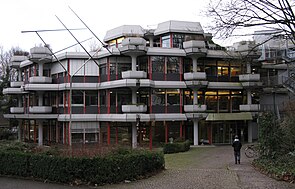Max Planck Institute for Research into Crime, Security and Law
| Max Planck Institute for Research into Crime, Security and Law | |
|---|---|
 The building as seen from Günterstalstrasse |
|
| Category: | research Institute |
| Carrier: | Max Planck Society |
| Legal form of the carrier: | Registered association |
| Seat of the wearer: | Munich |
| Facility location: | Freiburg in Breisgau |
| Type of research: | Basic research |
| Subjects: | Law Social Science |
| Areas of expertise: | Criminology , criminal law , public law |
| Basic funding: | Federal government (50%), states (50%) |
| Management: | Tatjana Hörnle, Ralf Poscher Jean-Louis van Gelder |
| Employee: | approx. 120 |
| Homepage: | https://csl.mpg.de/de/ |
The Max Planck Institute for Research into Crime, Security and Law (MPI-CSL) is a non-university research facility in Freiburg im Breisgau . It conducts basic research in the fields of criminology , criminal law and public law.
management
The institute is headed by the directors Tatjana Hörnle , Ralf Poscher and Jean-Louis van Gelder.
In spring 2019 there were around 120 employees at the institute. Ulrich Sieber , Hans-Jörg Albrecht and Albin Eser are the directors emeritus at the institute .
history
The Max Planck Institute for Research into Crime, Security and Law goes back to the seminar for foreign and international criminal law at the University of Freiburg. This was in 1938 by the then holder of the chair for criminal law at the law and political science faculty, Prof. Dr. Adolf Schönke , applied for and approved by the Baden Ministry of Education and Culture later this year. It was named "Institute for Foreign and International Criminal Law" in 1947. In 1966 the institute was accepted into the Max Planck Society and was named "Max Planck Institute for Foreign and International Criminal Law".
In 1978 the institute moved into its striking new building designed by the architect Herbert Dörr in Freiburg's Wiehre , where it is still housed today. The architectural style is assigned to brutalism . The heart of the four-story building is the library, which extends over several floors and currently has approx. 480,000 books.
In the course of the redesign of the research profile in 2019, the institute was renamed as "Max Planck Institute for Research into Crime, Security and Law" on March 1, 2020.
Research profile
The Max Planck Institute for Research into Crime, Security and Law is part of the Humanities, Social and Human Sciences Section of the Max Planck Society for the Advancement of Science. It is divided into three research departments: Criminology, Public Law and Criminal Law. The research focus of the institute is fundamentally oriented and at the same time application-oriented due to the interdisciplinary legal and social science research approach. The independent research areas are methodically interlinked and coordinated through the choice of their research subjects. In terms of research methods, the departments complement each other with their different research approaches and theoretical perspectives.
In the course of the new appointments to the management level of the institute in 2019, the programmatic guidelines of the research agenda were comprehensively realigned. The focus of the work of the criminal law department is the development of a transnational criminal law theory. By analyzing the different national criminal law traditions, including the practical aspects of criminal prosecution, a comprehensive cartography of the various instruments, concepts and possible solutions should be developed on the basis of specific questions. The research agenda of the Department of Public Security Law addresses security-relevant issues that cannot be captured, or cannot be captured with instruments of criminal law alone. In addition to general theoretical and dogmatic questions, the current legal, technical and social developments - internationalization, digitization and fragmentation - are taken up and the associated normative challenges of hazard prevention with regard to the protection of fundamental rights, the rule of law and the principle of democracy are analyzed. The research program of the criminological department focuses on the theoretical and empirical explanation of norm-conforming and norm-deviating behavior. On the basis of mainly psychological theories, innovative research methods, which also include computer-aided experiments using virtual reality programs, will be used to research how individual behavioral processes are presented ad hoc, develop or change over the long term, and how these can be explained.
With this programmatic list, the entire spectrum of all current security-relevant issues - related to phenomena as well as to the actors, instances, concepts and instruments - can be comprehensively recorded and processed analytically and methodically.
literature
- Max Planck Society (ed.): Max Planck Institute for Foreign and International Criminal Law Series: Reports and communications of the Max Planck Society 1985/4, ISSN 0341-7778
- Research report 2015-2017
Web links
- Homepage of the Max Planck Institute for Research into Crime, Security and Law
- Homepage of the Max Planck Society
Individual evidence
- ↑ Home. Retrieved May 9, 2019 .
- ^ Library. Retrieved March 5, 2020 .
- ↑ New topics, new name - Max Planck Institute for Research into Crime, Security and Law. Retrieved March 4, 2020 .
Coordinates: 47 ° 58 ′ 52 " N , 7 ° 50 ′ 56.3" E